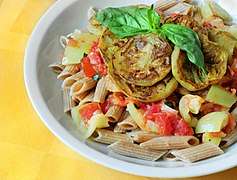Diet food
Diet food (or dietetic food) refers to any food or beverage whose recipe is altered to reduce fat, carbohydrates, and/or sugar in order to make it part of a weight loss program or diet. Such foods are usually intended to assist in weight loss or a change in body type, although bodybuilding supplements are designed to aid in gaining weight or muscle.


Terminology
In addition to diet other words or phrases are used to identify and describe these foods including light, zero calorie, low calorie, low fat, no fat and sugar free. In some areas use of these terms may be regulated by law. For example, in the U.S. a product labeled as "low fat" must not contain more than 3 grams of fat per serving; and to be labeled "fat free" it must contain less than 0.5 grams of fat per serving.[1]
Process
The process of making a diet version of a food usually requires finding an acceptable low-food-energy substitute for some high-food-energy ingredient.[2] This can be as simple as replacing some or all of the food's sugar with a sugar substitute as is common with diet soft drinks such as Coca-Cola (for example Diet Coke). In some snacks, the food may be baked instead of fried thus reducing the food energy. In other cases, low-fat ingredients may be used as replacements. If you are doing on a low-fat diet, there are many benefit in this diet. Low-fat diets can help you lose weight by using calories on more filling food, and ward off serious medical conditions, including heart disease, high cholesterol, and diabetes.
In whole grain foods, the higher fiber content effectively displaces some of the starch component of the flour. Since certain fibers have no food energy, this results in a modest energy reduction. Another technique relies on the intentional addition of other reduced-food-energy ingredients, such as resistant starch or dietary fiber, to replace part of the flour and achieve a more significant energy reduction.
Example of low-fat foods
The low-fat foods are those that have 30% of their calories or less from fats. So, if a food contains fewer than 3 gram of fat per 100 calories, it is a low fat food. Examples of cereals, grain, and pasta products are corn or whole wheat tortillas, oatmeal, backed cracker, whole grain versions of noodles, and pita bread. Examples of protein sources are beans, lentils, tofu, egg white, tuna, and peas. On the other hand, polysaturated such as omega 3 and omega 6 fatty acids can be beneficial to the body. Nutritious foods are avocado, almond, salmon, cashews, seeds, and walnuts.[3]
Controversy
In diet foods[4] which replace the sugar with lower-food-energy substitutes, there is some controversy based around the possibility that the sugar substitutes used to replace sugar are themselves harmful.[5][6][7] Artificial sweeteners have been the subject of intense scrutiny for decades, but according to the National Cancer Institute and other health agencies, there is no sound scientific evidence that any of the artificial sweeteners approved for use in the U.S. cause cancer or other serious health problems. Numerous research studies confirm that artificial sweeteners are generally safe in limited quantities, even for pregnant women.[8]
In many low-fat and fat-free foods the fat is replaced with sugar, flour, or other full-food-energy ingredients, and the reduction in food energy value is small, if any.[9]
See also
- Negative-calorie food
- Olestra
- Online weight loss plans
- Obesity paradox
References
- Definitions of Nutrient Content Claims, U.S. Food and Drug Administration Archived October 5, 2016, at the Wayback Machine
- "Low-Energy-Dense Foods" (PDF).
- "Low fat foods: List, benefits, and meal plan". Medical News Today. Retrieved 2019-11-25.
- Diet and good food, National Health Service
- Sandee LaMotte. "Can artificial sweeteners cause weight gain?". CNN. Retrieved 2019-11-11.
- "The best and worst sugar substitutes for your health". finance.yahoo.com. Retrieved 2019-11-11.
- EDT, Janissa Delzo On 3/16/18 at 4:45 PM (2018-03-16). "Artificial sweeteners like Splenda may make Crohn's Disease gut issues worse, a study showed". Newsweek. Retrieved 2019-11-11.
- "Artificial sweeteners and other sugar substitutes". mayoclinic.org. Retrieved 2012-10-09.
- Fat-Free vs. Regular Calorie Comparison, U.S. Food and Drug Administration